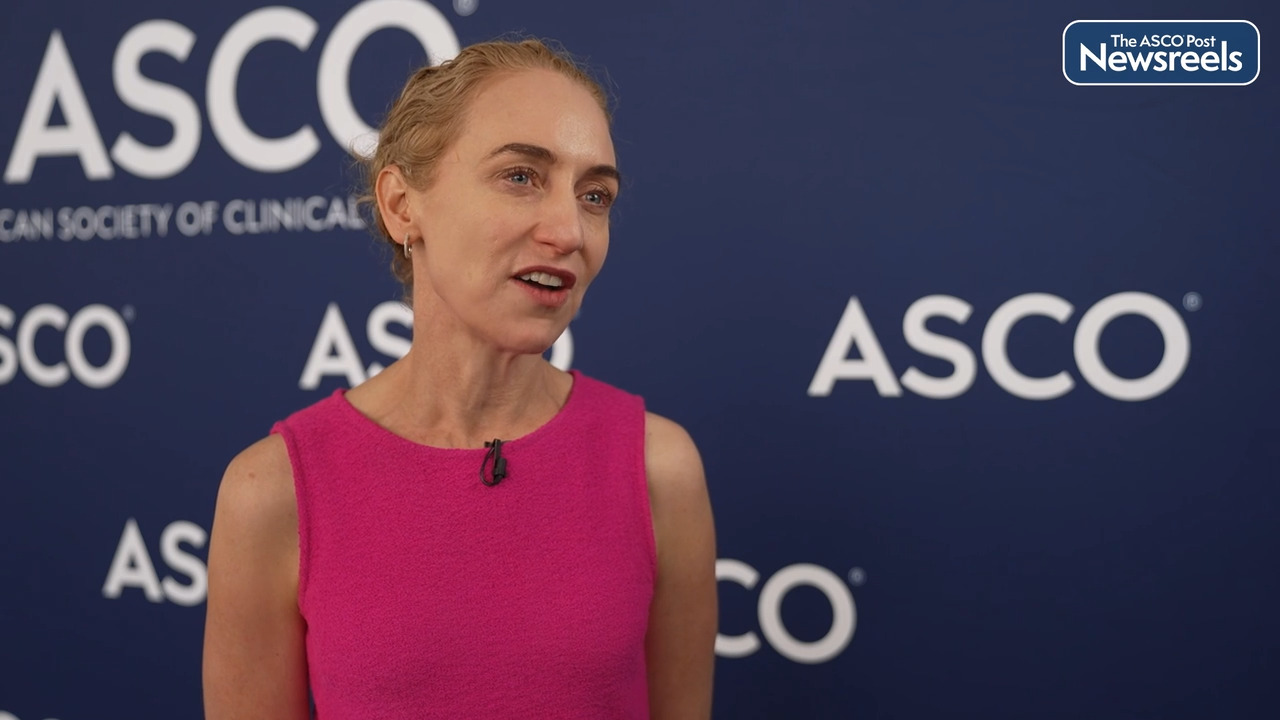Thomas E. Hutson, DO, PharmD, on RCC: Overall Survival Analysis of Lenvatinib, Pembrolizumab, and Sunitinib
2023 ASCO Annual Meeting
Thomas E. Hutson, DO, PharmD, of Texas Oncology, discusses the 4-year follow-up results from the CLEAR study for patients with advanced renal cell carcinoma (RCC). The data showed that lenvatinib plus pembrolizumab continues to demonstrate clinically meaningful benefit vs sunitinib in overall and progression-free survival, as well as in overall and complete response rates, in first-line treatment (Abstract 4502).
Transcript
Disclaimer: This video transcript has not been proofread or edited and may contain errors.
Thomas E. Hutson :
On behalf of my co-investigators, I presented the final pre-specified overall survival from the Phase 3 CLEAR study with nearly four years follow up. The Phase 3 CLEAR study was an international randomized trial comparing Lenvatinib pembrolizumab, Lenvatinib everolimus versus Sunitinib as first-line therapy for patients with advanced renal cell carcinoma.
This data had previously been reported when it met its primary efficacy endpoint, which was improvement in progression-free survival. At that time of that presentation, the secondary endpoints of overall survival and objective response rates were also statistically significant. This resulted in regulatory approval of this regimen and rapid incorporation of this regimen as a major frontline therapy option for patients with advanced RCC throughout the world. This information was also previously published in the New England Journal of Medicine.
Now, with additional 23 months follow up, pleased to report that our overall survival is maintained with a hazard ratio of 0.79, and our other efficacy signals such as progression-free survival and response rate remain robust with this longer follow-up. There were also no new additional safety signals.
So in conclusion, we're pleased to report with additional nearly four years of follow-up the overall survival progression-free survival and objective response rates remain significant and robust when compared with Sunitinib with no new safety signals of the regimen. And Pembrolizumab and Lenvatinib remain a primary therapy for patients with advanced RCC.
Related Videos
The ASCO Post Staff
Bobbie J. Rimel, MD, of Cedars-Sinai Medical Center, and Isabelle L. Ray-Coquard, MD, PhD, of Centre Léon Bérard and the University Claude Bernard Lyon Est, discuss findings from the COLIBRI trial, which showed that, for patients with cervical squamous cell carcinoma, neoadjuvant nivolumab plus ipilimumab is safe and orchestrates de novo immune responses. The 82.5% complete response rate for primary tumors 6 months after standard chemoradiation therapy suggests favorable clinical outcomes (Abstract 5501).
Ajay K. Nooka, MBBS, of Winship Cancer Center of Emory University, discusses phase II findings showing that, in patients with high-risk myeloma, maintenance therapy with carfilzomib, pomalidomide, and dexamethasone deepened responses. Measurable residual disease negativity was attained in 80% of patients.
The ASCO Post Staff
Lisa M. DeAngelis, MD, and Ingo K. Mellinghoff, MD, both of Memorial Sloan Kettering Cancer Center, discuss findings from the INDIGO trial showing that the IDH1/2 inhibitor vorasidenib improves progression-free survival for patients with residual or recurrent grade 2 glioma with an IDH1/2 mutation. These data demonstrate the clinical benefit of vorasidenib in this patient population for whom chemotherapy and radiotherapy are being delayed.
The ASCO Post Staff
Georgina V. Long, MD, PhD, of Melanoma Institute Australia and The University of Sydney, discusses new data showing that patients with resected stage IIB/C melanoma who were treated with adjuvant nivolumab had prolonged recurrence-free survival compared with placebo across all biomarker subgroups. The baseline biomarkers most predictive of prolonged recurrence-free survival with nivolumab were high interferon gamma score, high tumor mutational burden, CD8 T-cell infiltration, and low C-reactive protein (Abstract 9504).
The ASCO Post Staff
Tycel J. Phillips, MD, and Alex F. Herrera, MD, both of the City of Hope National Medical Center, discuss results from the SWOG S1826 study, which showed that nivolumab and AVD (doxorubicin, vinblastine, and dacarbazine) improved progression-free survival vs brentuximab vedotin plus AVD in patients with advanced-stage classical Hodgkin lymphoma. Longer follow-up is needed to assess overall survival and patient-reported outcomes. This trial may be a key step toward harmonizing the pediatric and adult treatment of advanced-stage disease (LBA4).




